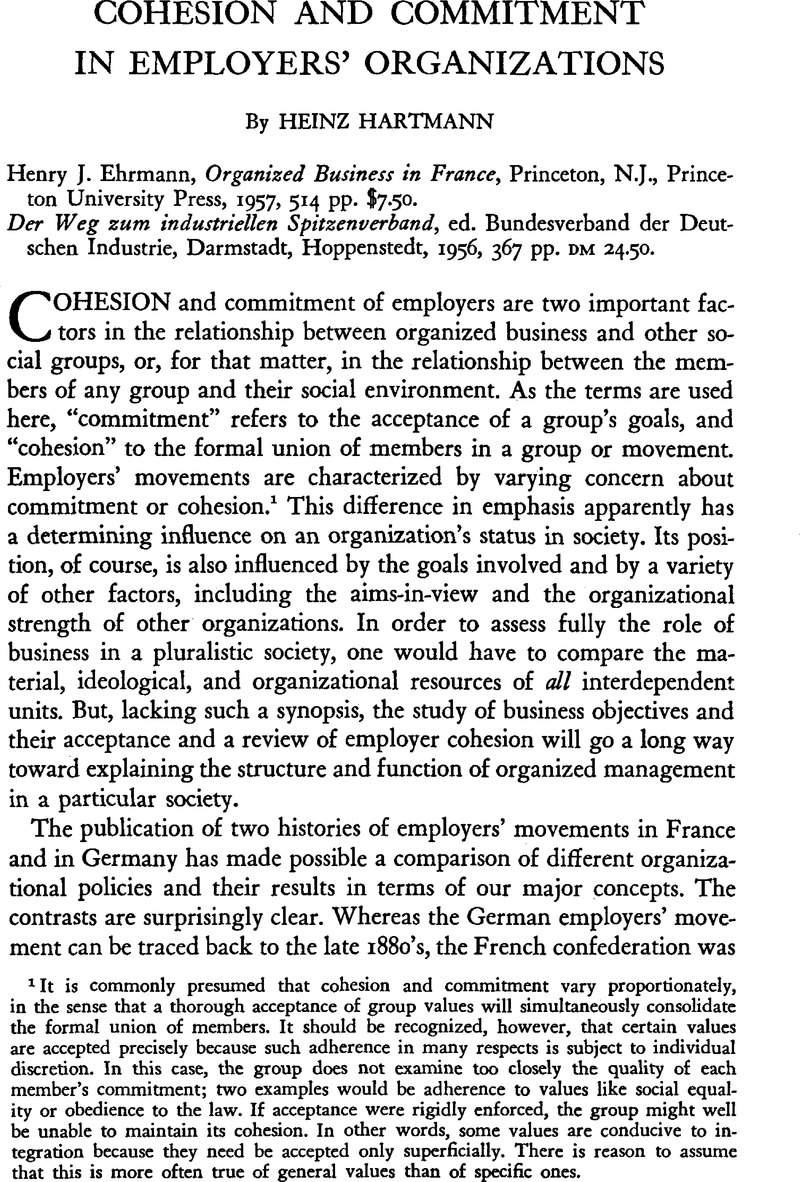Article contents
Cohesion and Commitment in Employers' Organizations
Published online by Cambridge University Press: 18 July 2011
Abstract

- Type
- Review Articles
- Information
- Copyright
- Copyright © Trustees of Princeton University 1959
References
1 It is commonly presumed that cohesion and commitment vary proportionately, in the sense that a thorough acceptance of group values will simultaneously consolidate the formal union of members. It should be recognized, however, that certain values are accepted precisely because such adherence in many respects is subject to individual discretion. In this case, the group does not examine too closely the quality of each member's commitment; two examples would be adherence to values like social equality or obedience to the law. If acceptance were rigidly enforced, die group might well be unable to maintain its cohesion. In other words, some values are conducive to integration because mey need be accepted only superficially. There is reason to assume that this is more often true of general values than of specific ones.
2 Conseil National du Patronat Français.
3 Union des Chefs d'Entreprise. Action pour des Structures Humaines.
4 He continued: “But they rendered us capable of learning everything.”
5 Eugene Burgess, “Management in France,” unpublished manuscript, p. 22.
6 Short for CGPME, or Confédération Générale des Petites et Moyennes Entreprises.
7 Association des Cadres Dirigeants et de l'Industrie pour le Progrès Social et Economique.
8 In contrast to the functional authority of the expert, this other authority must be “formal” or “final”—i.e., founded on such non-rational bases as tradition, charisma, or ultimate values.
9 Bundesverband der Deutschen Industrie.
10 Bundesvereinigung Deutscher Arbeitgeberverbände (BDA).
11 Deutscher Industrie- und Handelstag (DIHT).
12 Arbeitsgemeinschaft Selbständiger Unternehmer.
13 The major exceptions to this rule are the “labor directors” in the codetermination industries, who are nominated by the trade unions.
14 Jahresbericht des BDI, May 1, 1957–April 30, 1958, pp. 70–71.
15 Gundlach, Gustav, “Der Unternehmer in christlicher Schau,” in Beitrag zur Förderung des Unternehmernachwuchses, ed. by BDI (Drucksache, No. 28), Bergisch-Gladbach, Heider, n.d., p. 83.Google Scholar
16 Unternehmer in der Politik, ed. by Gustav Stein, Düsseldorf, Econ Verlag, 1954, pp. 9, 11.
17 Ibid., p. 24.
18 Ibid., p. 54.
- 2
- Cited by




